Books about Death Penalty in Texas
Ken Light and Suzanne Donovan - TEXAS DEATH ROW
Copyright 1997 by the University Press of Mississippi
"Ken Light and his camera were permitted unparalleled access to Texas death row. His stark, powerful images show where and how the condemned live. In the year he took these pictures (1994), fourteen men were executed in Texas. Suzanne Donovan's essay draws upon her interviews with the condemned men and with prison authorities, family members, and members of the victim's families.
Whoever opens this book will want to look away, for the pictures and words force us to gaze intimately into the eye of death. Light's photographs make us ask what we have done in sanctioning execution.
With ninety percent approval, no other place in America has approved the death sentence so overwhelmingly as Texas.
Ken Light's raw, austere photographs and the accompanying text reveal what we have created in the hopeless world of court-ordered death. Who are the men who exist there? What do they look like? How do they survive, and what are the rhythms of their daily lives? While outsiders focus on the final act of execution, the real drama unfolds each day in this arcane world.
Ken Light is a social documentary photographer whose work has appeared in books, magazines, and exhibitions. He teaches in the Graduate School of Journalism at the University of California Berkeley. Suzanne Donovan is a freelance journalist, a former director of the American Civil Liberties Union of Texas, and project specialist for the Texas Council on Family Violence."
§%&%§%&%§
LIVING NEXT DOOR TO THE DEATH HOUSE
by Virginia Stem Owens and David Clinton Owens
Copyright 2003 by William B. Eerdmans Publishing Co.
"When
a prisoner on death row is executed, it's not just the families of the murderer
and the victim who feel the effects. The attorneys, the jury, the law enforcement
officers, the prison guards, the wardens overseeing the execution, the chaplains
and advisors, the technicians 'who prepare the syringe and prick the vein'
- all of these people are affected, and they all have powerful stories to
tell, stories that are woven together in the riveting narrative of Living
Next Door to the Death House.
Authors Virginia Stem Owens and David Clinton Owens live in Huntsville, Texas, which has earned a reputation as the death penalty capital of the United States. They call Huntsville 'a company town,' where the company in question, the Texas Department of Criminal Justice, employs almost a quarter of the residents. With so much of the population directly connected to the prison system, the ultimate punishment - meted out as often as once a week - is always 'next door.'
Through candid, compelling interviews with those in Huntsville connected both personally and professionally to the Texas prison system and death row, the authors explore how the steady stream of executions in the town has affected these people and the community at large. As the Owenses show, the ever-present death chamber 'reaches out like tentacles to touch the lives of everyone who lives here.' Some of the people they talk to are in favor of the death penalty, some are against it, many are conflicted.
Living Next Door to the Death House shows unforgettably the human face of one of the most controversial and hotly debated issues in the United States today."
HIGHLY RECOMMENDED!
§%&%§%&%§
LETHAL INJECTION - Capital Punishment in Texas during the Modern Era
by Jon Sorensen and Rocky Leann Pilgrim
Copyright 2006 by the University of Texas Press
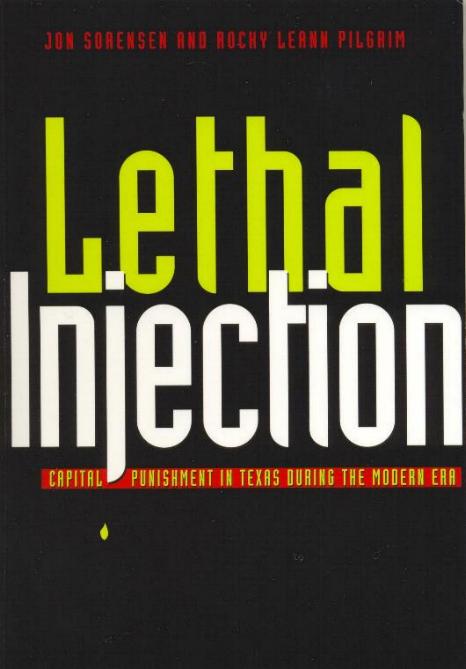 "Few state issues have attracted as much controvery
and national attention as the application of the death penalty in Texas.
In the years since the death penalty was reinstated in 1976, Texas has led
the nation in passing death sentences and executing prisoners. The vigor
with which Texas implements capital punishment has, however, raised more
than a few questions.
"Few state issues have attracted as much controvery
and national attention as the application of the death penalty in Texas.
In the years since the death penalty was reinstated in 1976, Texas has led
the nation in passing death sentences and executing prisoners. The vigor
with which Texas implements capital punishment has, however, raised more
than a few questions.
Why has Texas been so fervent in pursuing capital punishment? Has an aggressive death penalty produced any benefits? Have dangerous criminals been deterred? Have rights been trampled in the process and, most importantly, have innocents been executed? These important questions form the core of Lethal Injection: Capital Punishment in Texas during the Modern Era.
This book is the first comprehensive empirical study of Texas's system of capital punishment in the modern era. Jon Sorensen and Rocky Pilgrim use a wealth of information gathered from formerly confidential prisoner records and a variety of statistical sources to test and challenge traditional preconceptions concerning racial bias, deterrence, guilt, and the application of capital punishment in the state.
The results of their balanced analysis may surprise many who have followed the recent debate on this important issue."
§%&%§%&%§
PRISON CITY - Life with the Death Penalty in Huntsville, Texas
by Ruth Massingill & Ardyth Broadrick Sohn
Copyright 2007 by Peter Lang Publishing Inc.
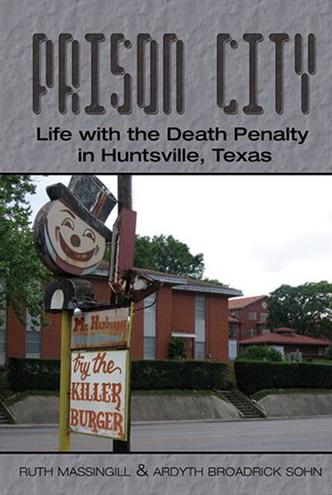 "Prison City looks beneath the placid surface
of Huntsville, Texas, execution capital of the world, and sheds light on
controversial issues usually hidden behind penitentiary walls. The authors
draw on a multitude of voices from the community surrounding the prison -
from inmates and guards to neighboring residents and local politicians -
to reflect on questions of crime and punishment, vengeance, and forgiveness.
"Prison City looks beneath the placid surface
of Huntsville, Texas, execution capital of the world, and sheds light on
controversial issues usually hidden behind penitentiary walls. The authors
draw on a multitude of voices from the community surrounding the prison -
from inmates and guards to neighboring residents and local politicians -
to reflect on questions of crime and punishment, vengeance, and forgiveness.
We see how the sophisticated communication techniques employed by inmates, information officers, and community leaders shape opinions in the small towns where prisons are a principal industry. The poignant, evocative stories that run throughout the book highlight the incarcerated population's increasing influence in the political, cultural, and economic landscape in the United States. Most of all, Prison City offers opportunities to understand why the Texas justice system has become a global metaphor for incarceration and capital punishment.
Ruth Massingill is a professional communicator as well as a faculty member at Sam Houston State University in Texas. ... Ardyth Broadrick Sohn is Professor and Director of the Hank Greenspun School of Journalism and Media Studies at the University of Nevada - Las Vegas. ..."
§%&%§%&%§
THE ROPE, THE CHAIR, AND THE NEEDLE - Capital Punishment in Texas, 1923-1990
by James W. Marquart, Sheldon Ekland-Olson, Jonathan R. Sorensen
Copyright 1994 by the University of Texas Press
"In
late summer 1923, legal hangings in Texas came to an end, and the electric
chair replaced the gallows. Of 520 convicted capital offenders sentenced
to die between 1923 and 1972, 361 were actually executed, thus maintaining
Texas' traditional reputation as a staunch supporter of capital punishment.
This book is the single most comprehensive examination to date of capital punishment in any one state, drawing on data for legal executions from 1819 to 1990. The authors show persuasively how slavery and the racially biased practice of lynching in Texas led to the institutionalization and public approval of executions skewed according to race, class, and gender, and they also track long-term changes in public opinion up to the present.
The stories of the condemned are masterfully interwoven with fact and interpretation to provide compelling reading for scholars of law, criminal justice, race relations, history, and sociology, as well as partisans on both sides of the debate.
James W. Marquart is an associate professor of criminal justice at Sam Houston State University in Huntsville, Texas. Sheldon Ekland-Olson is a professor of sociology and dean of the College of Liberal Arts at the University of Texas at Austin. Jonathan R. Sorensen is an assistant professor of criminal justice at the University of Texas, Pan American."
§%&%§%&%§
Don Reid (with John Gurwell) - HAVE A SEAT, PLEASE
Copyright 2001 by Texas Review Press
361 men died
in the electric chair of Texas between 1924 and 1964 . As a journalist Don
Reid witnessed 189 of those executions and reports his experiences in
this book - initially published under the title "Eyewitness".
"HAVE A SEAT, PLEASE is an in-depth and honest look inside the Texas process of executions by Don Reid, who witnessed 189 eletrocutions and during the process was transformed from an avid supporter of capital punishment to an active and vocal opponent.
Reid takes the reader up-close and personal with his compelling accounts of the condemned on death row and his eyewitness reports of their horrific deaths. Just as captivating is his personal journey of self-discovery as he carefully examines the very emotional and highly debated issue of capital punishment.
Although the method of legalized homicide in Texas is different now, the book is as valid today as it was 35 years ago." (Jim Willett, retired warden, Walls Unit, Texas Department of Criminal Justice)
§%&%§%&%§
Rev. Carroll Pickett (with Carlton Stowers) - WITHIN THESE WALLS
Copyright 2002 by St. Martin's Press New York
"Within These Walls is a powerful memoir of Rev. Carroll Pickett, who spent fifteen years as the death house chaplain at 'The Walls', the Huntsville unit of the Texas prison system. In that capacity Reverend Pickett ministered to ninety-five men before they were put to death by lethal injection. They came with sinister nicknames like 'The Candy Man' and 'The Good Samaritan Killer,' some contrite, some angry - a few who might even have been innocent. All of them found in Reverend Pickett their last chance for an unbiased confessor who would look at them only as fellow humans, not simply as the convicted criminals the rest of society had already dismissed them as. This firsthand experience gave Reverend Pickett the unique insight needed to write an impassioned statement on the realities of capital punishment in America. The result is a thought-provoking and compelling book that takes the reader inside the criminal mind, inside the execution chamber, and inside the heart of a remarkable man who shares his thoughts and observations not only about capital punishment, but about the dark world of prison society."
Rev. Pickett:
>>>And there is the matter of "closure," which we hear so much about.
In those dark early mornings following an execution, I spoke with the loved
ones of crime victims - husbands and wives; mothers fathers and children
- and almost without an exception found that the feeling of relief so long
anticipated was not realized. A death, however horrible and senseless, cannot
be erased by another death, however quick and humane. As a young woman once
said to me following the execution of the man who murdered her mother, "It
really doesn't change anything, does it? It doesn't bring her back. Her
grandchildren still won't ever be able to see her." All the death penalty
does, I strongly believe, is create another set of victims. By killing a
person, we inflict great damage on yet another family. While I do not wish
to be viewed as some naive apologist for the evils of those deserving punishment,
I know that they, too, have loved ones, who grieve just as desperately as
do the families of their victims. I've watched them make tearful visits to
the Death House, knowing it would be the last time they would see their husband,
father, brother, or son alive. I've seen prison guards turn in their badges,
wardens walk away from their jobs, and fellow chaplains sink in to such depressed
states that they were forced to turn away from their calling. They, too,
have been victims of a legal system that insists not only on the right but
the duty to take the life of another human being. And so, yes, I am among
those growing voices who believe it is time that lawmakers and peacekeepers,
members of the greatest society in the world, come to the civilized realization
that the cruel act of revenge - however cloaked in legal terms - nets us
nothing and diminishes us all.<<<
HIGHLY RECOMMENDED!
§%&%§%&%§
Jim Willett (and Ron Rozelle) - WARDEN
Copyright 2004 by Bright Sky Press
"Jim Willett never intended
to preside over more legal executions than anyone else alive. 'Warden' is
the story of Willett's thirty-year career in Texas prisons, from his first
night as a shotgun-wielding guard to the last man he escorted to the death
chamber. ...
Using journal excerpts, Willett chillingly reconstructs the duty he hated most as warden of the Walls: the eighty-nine times he accompanied condemned men to the death chamber. Some of those were famous, such as Gary Graham; others were hardly noticed. Some remained vicious to the end; others apologized to their victim's relatives. Some cursed; some prayed.
But to the prison system, those differences didn't matter. After the tie-down crew secured the condemned, after the medical crew inserted IV lines, and after the man spoke his last words, it was Willett's turn to do his part. Sometimes he pressed a hidden button. Sometimes he simply lifted his glasses from his nose. But always his signal meant the same thing. It was time for the executioner to begin, time for the deadly fluids to flow, time for the state to end a man's life. ...
Jim Willett saw working as a guard in the Texas prison system as an easy way to make money while in college. Thirty years later, he retired as the warden of the Walls Unit, the system's flagship - and the unit where all Texas executions are carried out."
§%&%§%&%§
Susan Lee Campbell Solar (Edited by S. Bright): NO JUSTICE, NO VICTORY - The Death Penalty in Texas
Copyright 2004 by Plain View Press
"Because state sponsored murder adds more anguish to society
than it redresses, because people of color who are poor are over represented
on death row, because our court systems are flawed and resources for defense
are unevenly available, because healing for individuals and society comes
not from retaliation, but from forgiveness, 'No Justice, No Victory' is a
welcome addition to the increasing body of abolitionist work which is turning
American opinion against capital punishment." (Sister Helen Prejean, author
of 'Dead Man Walking')
"Through keen and compassionate eyes, Susan Lee Campbell Solar helps us see why Texas leads the country in executions. The information she presents is grounded in scholarly research and compelling written. Her insight into the corrosive effects of the death penalty on everyone, including the families of murder victims, should renew our courage to end this war against our own." (Richard Burr, death penalty defense attorney)
"Having to live your life as a family member of someone on death row is like being there yourself. Every pain they feel, you feel. In the case of an innocent man serving time, not only does it destroy the life of the accused, it also wipes out the hopes and dreams of a whole family and in the end, everyone loses - no justice, no victory." (Arthur Curry, brother of Anthony Graves, Texas death row inmate)
§%&%§%&%§
TEXAS DEATH ROW - Executions in the Modern Era
Copyright 2000 by SunRiver Cartel
"This book presents the factual
record preserved by the Texas Department of Criminal Justice for each of
the individual offenders executed by the State of Texas in the modern era.
The modern era is the period following the June 29, 1972, U.S. Supreme Court
ruling in Furman v. Georgia, which declared capital punishment, as then
administered, unconstitutional, and the reinstitution of the death penalty
in Texas following passage of House Bill 200 by the Sixty-Third Legislature
in Texas, which became effective on June 14, 1973, and satisfied the concerns
of the U.S. Supreme Court concerning the unconstitutional nature of the death
penalty in Texas.
The entries are listed in order of execution, beginning with # 1, Charlie Brooks, and ending with # 222, Gary Lee Graham, the last execution to occur before this book went to press on June 25, 2000.
The Texas Department of Criminal Justice (TDCJ) provided all of the information in this book. Those seeking more information are encouraged to visit the Texas Department of Criminal Justice website at www.tdcj.state.tx.us/. Every effort was made to collect photos and complete information on each executed offender.
In recent months, the debate over the death penalty has increased in volume and vehemence. It is our hope that the information presented in this book will help educate citizens about publicly funded executions."
(A Second Edition was published in 2006, ending with # 376, and a Third Edition in 2008 - by Bill Crawford.)
If this sort of book is qualified to educate about Capital Punishment or if it's a book which tries to satisfy the voyeurism of some people, everyone may judge himself...
§%&%§%&%§
Brian D. Price - MEALS TO DIE FOR
Copyright 2004 by Dyna-Paige-Corporation
"My
name is Brian Price; an inmate assigned to the infamous Walls Unit in Huntsville,
Texas, U.S.A. For the past ten years, I have been the cook who prepares the
last meal requests for the condemned who are brought here to the Walls to
be executed. Since volunteering for this grim task in 1991, I have prepared
almost 200 of these dark-dining delights for the wretched souls who are about
to depart this world on the Grim Reaper's 6 o'clock p.m. train to eternity.
During this premillennial decade that I've spent here behind the walls, I've seen and heard a lot of things that only a person in my position is privy to. I'd like to shed some light on what is hidden in the shadows of these dramatically structured events, and also on some of the heinous crimes that set these executions in motion. I now invite you to take a voyeur's voyage behind the scenes and journey with me into the realms of modern-day madness.
... In my opinion the death penalty will continue in Texas until it is stopped on a federal level, nationwide. Maybe someday we will have a president who, when it comes to issues like the death penalty and abortion, isn't worried about his political standing in the polls - someone who respects life unconditionally. But until that time comes, the killing will continue at a record pace. The saddest part is as a whole, society condones it, brainwashed by self-serving politicians into believing that capital punishment has an effect in deterring violent crime. The truth is, it is merely retribution/payback, and nothing more. Yet when I read about heinous and unspeakable crimes that continue to happen on Texas' streets, I too want to cry out in harmony with the victim's families, "An eye for an eye!" Quite a dilemma, perplexing to say the least. One has to search the depths of his or her own soul to try to find an answer to this quandary. After ten years of being so closely involved with over 170 executions, I've come to the conclusion: There is no answer - only more questions."
§%&%§%&%§
Nanon M. Williams - THE DARKEST HOUR - Death Row Stories & Interviews
Copyright 2002 by Breakout Publishing
"'The
Darkest Hour' walks a fine line between being cold hearted and purely factual,
versus being so maudlin that people will find it hard to digest. What I see
is not a profile of people, but instead a profile of society. I am sure there
are others like me who will want to read this book." (Dr. Gary Aitcheson,
Forensic Psychiatrist)
"'The Darkest Hour' takes you on a journey through Death Row's most rawest experiences. The reader is given an upclose look at six individuals' lives before death row and the current reality of life on 'The Row' as only known by those who live it daily. The author releases rays of light and hope in an otherwise dark and dismal place." (Lesesha Simmons)
"The reason I named the book, 'The Darkest Hour', is that consciously and unconsciously, most death row prisoners prepare for the last hour of their lives for many years. Many will search for a spiritual pathway to find peace. Many will become kind and compassionate people in an attempt to make amends for the wrongs they've done in life. Many will allow anger to make them lash out at others because the pain they feel just won't go away. Many will seek justice for being wrongly convicted and become a statistic for a future newspaper article. And many will see the world through a blind eye essential for the preservation of their sanity, until finally the illusions they see are ripped away to remind them of who they are, and how to escape their human conditions before it is too late. All come closer to the final hour of their existence, where everything comes crashing down all at once, and they are going somewhere else...somewhere other than the hell they live in. For us, the death row prisoner, this is known as 'The Darkest Hour'."
§%&%§%&%§
V. Wayne Sorge - WATCHING DEATH: CAPITAL PUNISHMENT IN AMERICA
Copyright 2004 by V. Wayne Sorge, published by PublishAmerica
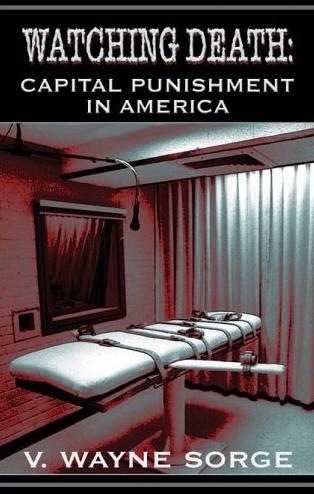 "Watching Death: Capital
Punishment in America is a unique collection of observations with additional
research about the ultimate punishment.
"Watching Death: Capital
Punishment in America is a unique collection of observations with additional
research about the ultimate punishment.
For ten years, Wayne Sorge observed executions in Texas while working as news director of KSAM AM/FM in Huntsville. He was the official reporter representing United Press International to witness executions during that period of time. He also witnessed executions in Mississippi later and coverd different aspects of the capital punishment debate earlier as he worked in Kansas. While in Huntsville, Wayne witnessed 183 lethal injections, including two women. He witnessed two men who were put to death in the state of Mississippi. During all that time, he has observed the debate of those who support or oppose the death penalty whether it be for political, religious or personal reasons, and he studied the concerns that prompted leaders in Illinois and elsewhere to challenge their system of capital punishment.
The book covers the final moments of those on death row as well as background on cases and the impact of capitaö punishment on communities and individuals."
§%&%§%&%§
Charles D. Flores - WARRIOR WITHIN: Inside Report on Texas Death Row
Copyright 2007 by Charles D. Flores
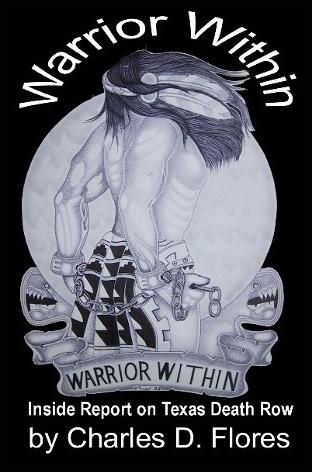 "One would expect a death-prison convict's hopes
to focus on his own exoneration, particularly in the case of an innocent
man like Charles. Though his life is certainly his main concern, the story
of Warrior Within concerns criminal justice and humane treatment for
all prisoners, not just the case of Charles Flores alone.
"One would expect a death-prison convict's hopes
to focus on his own exoneration, particularly in the case of an innocent
man like Charles. Though his life is certainly his main concern, the story
of Warrior Within concerns criminal justice and humane treatment for
all prisoners, not just the case of Charles Flores alone.
Charles opens a window into the Texas death prison. You are present there in the death machine, where you experience daily life with the incarcerated, the cadence of routine handcuffing and chaining, the clanging of metal gates, the clamor of noisy inmates, the humiliating invasive searches, the boredom of sensory and social deprivation, and the pervasive dear of the unknown.
Charles narrates the story of his life in death prison as he sees it, without reporting fearsay or digressing into generality. You meet the friends and cell-neighbors Charles has known and cared about first hand. You hear their conversations and get to know their character. The special bond of fellowship among real men under the death sentence dispels any vague image you may have had of violent, hardened criminals. Death prison convicts have regained much of their humanity here in this story."
§%&%§%&%§
David R. Dow - EXECUTED ON A TECHNICALITY - Lethal Injustice on America's Death Row
Copyright 2005 by David R. Dow, published by Beacon Press Boston
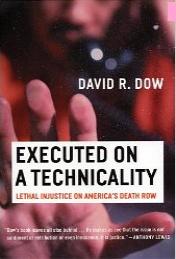 "Dow reveals the dirty little secret of American
death-penalty litigation: procedure trumps innocence... Executed on a
Technicality is insightful and full of the kinds of revelations that
may lead readers to reconsider their stand on the death penalty." (Steve
Mills, Chicago Tribune)
"Dow reveals the dirty little secret of American
death-penalty litigation: procedure trumps innocence... Executed on a
Technicality is insightful and full of the kinds of revelations that
may lead readers to reconsider their stand on the death penalty." (Steve
Mills, Chicago Tribune)
"Those who rund our death rows delude themselves that they operate a system rather than a lottery: here is living and working proof that with capital punishment, only the random is systematic." (Christopher Hitchens)
"At once intellectually unflinching and profoundly moving, Dow's book is a must-read for anyone who truly cares about American justice." (Barry Scheck, codirector of the Innocence Project and professor of law, Benjamin N. Cardozo School of Law, Yeshiva University)
"David R. Dow is professor of law at the University of Houston Law Center and an internationally recognized figure in the fight against the death penalty. He is the founder and director of the Texas Innocence Network and has represented more than thirty death row inmates. Regularly quoted in publications like the New York Times and the Washington Post, Dow lives in Houston, Texas."
§%&%§%&%§
David Atwood (Founder of Texas Coalition to Abolish the Death Penalty) - DETOUR TO DEATH ROW
Copyright 2008 by David Atwood, published by peaceCENTER Books
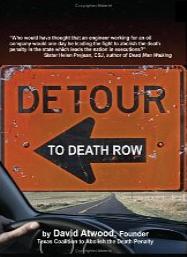 "Dave Atwood's Detour to Death Row is an incredible
journey which shows what can happen to a person who allows God to enter his
life and lead him on different path. Who would have thought that an engineer
working for an oil company would one day be leading the fight to abolish
the death penalty in the state which leads the nation in executions? Dave's
story is an inspiration to me, personally, and to anyone who believes in
the sanctity of all human life." (Sister Helen Prejean, author of 'Dead Man
Walking')
"Dave Atwood's Detour to Death Row is an incredible
journey which shows what can happen to a person who allows God to enter his
life and lead him on different path. Who would have thought that an engineer
working for an oil company would one day be leading the fight to abolish
the death penalty in the state which leads the nation in executions? Dave's
story is an inspiration to me, personally, and to anyone who believes in
the sanctity of all human life." (Sister Helen Prejean, author of 'Dead Man
Walking')
"Dave Atwood is a dedicated advocate for human rights who has worked tirelessly against the death penalty for many years. This work is particularly difficult in Texas where officials strongly support capital punishment. Dave's book is a wonderful description of how he grew into this work and organized efforts in Texas to oppose this inhumane form of punishment. I highly recommend it to anyone who is interested in creating a more civilized society." (Frances Farenthold, Texas legislator, attorney and educator)
"David Atwood, a retired oil company engineer, has spent more than 15 years working to abolish the death penalty in Texas. He is the founder of the Texas Coalition to Abolish the Death Penalty. David lives in Houston."
§%&%§%&%§
David D. Dow - THE AUTOBIOGRAPHY OF AN EXECUTION
Copyright 2010 by David R. Dow, published by Hachette Book Group
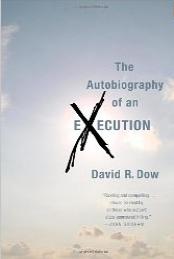 "As a proud father with a loving family,
David R. Dow is a typical red-meat-and-potatoes Texan who likes his bourbon
and his guns. But as a lawyer who represented more than a hundred death-row
cases, Dow has seen justice fail in matters of life and death...
"As a proud father with a loving family,
David R. Dow is a typical red-meat-and-potatoes Texan who likes his bourbon
and his guns. But as a lawyer who represented more than a hundred death-row
cases, Dow has seen justice fail in matters of life and death...
He has seen many of his clients put to death. Most were guilty. Some might have been innocent. Now, in this controversial, insightful book, David R. Dow reveals why he wages moral battles on behalf of people who have committed abhorrent crimes.
With brutal honesty, Dow takes you inside the issue in striking, intimate ways: through the complicated minds of judges, inside prisons and the execution-administration chambers, and into his own home, where the toil of working on these difficult cases is often paid. Ultimately, he shows us a world where suspense clings to every word and action - and where doing the right thing is never easy.
Regardless of your views on the death penalty, this enlightening book will open your eyes to the true face of capital punishment in America."
"A riveting and compelling account of a Texas execution written and narrated by a lawyer in the thick of the last-minute chaos. It should be read by all those who support state-sponsored killing." (John Grisham, author of 'The Innocent Man' and 'The Confession')
§%&%§%&%§
Upon this Chessboard of Nights and Days: VOICES FROM TEXAS DEATH ROW
Copyright 2009 by Texas Review Press, Huntsville (TX)
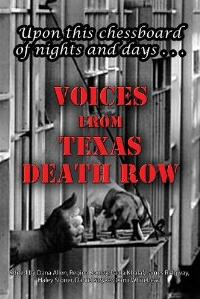 "The Texas Death Chamber, where the state of Texas
carries out executions of more inmates than any other state in the nation,
sits less than a mile away from where our graduate-level editing and publishing
class meets each week. This death chamber is so near to Sam Houston State
University that, in fact, there are actually some campus parking spots closer
to the Walls Unit, where the death chamber is located, than to our classroom.
...
"The Texas Death Chamber, where the state of Texas
carries out executions of more inmates than any other state in the nation,
sits less than a mile away from where our graduate-level editing and publishing
class meets each week. This death chamber is so near to Sam Houston State
University that, in fact, there are actually some campus parking spots closer
to the Walls Unit, where the death chamber is located, than to our classroom.
...
Like most people in Huntsville, we go about aour daily lives, hardly thinking twice about living blocks from the death chamber. All that changed when Dr . Paul Ruffin, our professor, proposed the idea of putting together a book of nonfiction submissions from Death Row inmates. As we set out on this project, the Texas death chamber went from being an abstract thought to something tangible. ...
The purpose of this book is, simply, that we would like those on the outside to be aware of the humanity of those on the inside. ... To this end, Voices from Texas Death Row was designed to be as unbiased as possible. Whatever our individual viewpoints or yours, the uniqueness of the stories in this book makes them worthy of being read, if for no other reason than to give readers an insider's view into a place that most of us will never know.
In our requests to Death Row inmates, we asked them to submit original artwork and nonfiction pieces about daily life on Death Row, the things that happen and the thoughts they have, along with memories from their past. Basically, we wanted them to share who they were in life before Death Row, what circumstances led them there, and who they are now as they wait for their execution date."
§%&%§%&%§
TEXAS DEATH ROW: REFLECTIONS OF A DIFFERENT WORLD - Art, Poetry, and Prose from the Row
Copyright 2010 by Texas Review Press, Huntsville (TX)
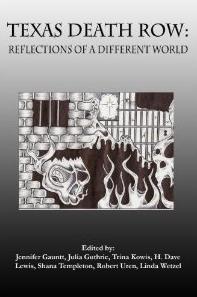 "This book, the class project for my 2009 graduate
Editing/Publishing Practicum, is a sequel to Upon this Chessboard of Nights
and Days: Voices from Texas Death Row, which my 2008 class put together.
"This book, the class project for my 2009 graduate
Editing/Publishing Practicum, is a sequel to Upon this Chessboard of Nights
and Days: Voices from Texas Death Row, which my 2008 class put together.
Students in these classes decide what sort of book they would like to publish, then solicit materials, evaluate them, assemble them into manuscripts, design a cover, and finally copyedit the book before it goes to the printer.
The first collection of work from Death Row was a resounding success... Since the class limited the literary selections in the first book to nonfiction prose, the 2009 class decided to solicit essays, short stories, poetry, and art for this sequel. In the first book we wanted to provide readers with an insight into the daily lives of these men: what they think and dream about, how they pass their time, how they handle the ever-present realization that eacht day that passes moves them one step closer to their date with the State.
In this book we wanted to give them an opportunity to express themselves through other genres. In both we wanted to feature their art." (Dr. Paul Ruffin, Sam Houston State University, Huntsville, Texas)
§%&%§%&%§
The quotations are taken from the books or the book wrappers.
For more information about these books try out http://www.amazon.com where almost all of them are available.
**********
Books about concrete persons on Texas Death Row:
Chasing Justice by Kerry Max Cook (about Kerry Max Cook)
Lethal Justice by Joy Elder (about Lesley Gosch)
From Death Row with Love by Margôt Aczel (about Ted Cole)
Karla Faye Tucker Set Free by Linda Strom (about Karla Faye Tucker)
Adams V. Texas by Randall Dayle Adams (about Randall Adams)
Hush Little Babies by Don Davis (about Darlie Routier)
Crossed Over by Beverly Lowry (about Karla Faye Tucker)
Bad Boy by Gary M. Lavergne (about Kenneth Allen McDuff)
Twisted Truth by Wendy Schmid-Eastwood (about Richard Wayne Jones)
A Saint On Death Row by Thomas Cahill (about Dominique Green)
The Grass Beneath His Feet by Roger Rodriguez (about Charles Thompson)
Texas, I Was Innocent by Gregory "Tony" Wright and Peter Bellamy (about Gregory Wright)
Texas, He Was Innocent by Bente Hjortshoj and Connie Wright (about Gregory Wright)
The Skeptical Juror And The Trial Of Cameron Todd Willingham by J. Bennett Allen (about Cameron Todd Willingham)
***
Plus a thought-provoking novel:
The Life of David Gale by Dewey Gram
**********
Some highly recommended books about Death Penalty - not about Texas:
Dead Man Walking by Sister Helen Prejean
Forgiving the Dead Man Walking by Debbie Morris
The Death of Innocents by Sister Helen Prejean
**********